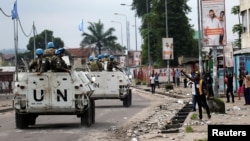The United States wants to cut by a quarter the troop cap for the U.N. peacekeeping mission in Democratic Republic of Congo, said diplomats, despite warnings by France and others against drastic changes to the world body's largest and most expensive operation.
The mandate for the $1.2 billion mission in the central African state, known as MONUSCO, expires on Friday. The confidential Security Council negotiations on its renewal are taking place amid U.N. warnings that violence is spreading across Congo ahead of planned elections before the end of 2017.
The United States wants the troop cap to be cut to 15,000, diplomats said, and despite a request by Secretary-General Antonio Guterres to add two extra police units - 320 officers - Washington does not want to change the current total of 1050.
Guterres told the council the extra police units were needed "in light of the increasing threat of violence related to the elections and the political situation."
The United States mission to the United Nations declined to comment due to the ongoing negotiations. "There's a reduction that can be made in MONUSCO," said a senior Security Council diplomat, speaking on condition of anonymity, last week. "It would be premature to massively draw down MONUSCO or massively change it this year."
It is the first peacekeeping mission to come up for renewal since U.S. President Donald Trump proposed that Washington – the largest U.N. contributor - cut funding to the world body.
U.S. Ambassador to the United Nations, Nikki Haley, is reviewing each of the 16 U.N. peacekeeping missions around the world and plans to spotlight the issue with a special meeting in April when the United States is president of the Security Council.
The Congo mission has a troop cap of 19,815, though there are only 16,893 U.N. soldiers on the ground after the previous U.N. chief Ban Ki-moon made reductions in 2015 and 2016.
The Security Council endorsed the reductions but refused to reflect the changes in the mandated strength of the force until it saw progress, snubbing Congolese government calls for the mission to be more than halved.
'Stakes high'
Resource-rich Congo, which gained independence from colonial power Belgium in 1960, has never had a peaceful transition of power and President Joseph Kabila's refusal to stand down when his final term expired in December raised fears the chronically unstable country could slide back into civil war.
Opposition leaders signed a fragile deal with the ruling coalition and allies of Kabila on Dec. 31 that requires him to step down after elections that must happen by the end of 2017.
France leads Security Council action on Congo and proposed a troop cap of 17,000, diplomats said. Following the U.S. call for a deeper cut, France has asked the U.N. Department of Peacekeeping how few troops the mission could operate with.
"Stakes are very high," French U.N. Ambassador Francois Delattre told reporters. "We can't allow the political process to derail. MONUSCO needs the capacities to prevent and act if necessary in case of troubles."
Washington provides the most money for the total $7.9 billion U.N. peacekeeping budget, paying 28.5 percent, but Trump and Haley want to enforce a 25 percent cap.
For the planned April council debate to review peacekeeping operations, Haley has asked her counterparts to consider "are current missions still 'fit for purpose?'" according to the two-page concept note, seen by Reuters.
A second senior council diplomat, speaking on condition of anonymity, warned: "We cannot sacrifice the effectiveness of the peacekeeping operations simply for the sake of saving resources."
Outgoing U.N. peacekeeping chief Herve Ladsous said the peacekeeping budget represents "0.4 percent of world military expenditure" and the cost of a U.N. operation was significantly less than a similar operation by a western country.
"We are in the process of closing down (Ivory Coast), we'll be closing down Liberia, we'll be closing down Haiti – that alone will save several hundreds of millions of dollars in the overall bill," Ladsous told reporters.





